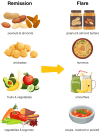From Evidence to Practice: A Narrative Framework for Integrating the Mediterranean Diet into Inflammatory Bowel Disease Management
- PMID: 39940329
- PMCID: PMC11821149
- DOI: 10.3390/nu17030470
From Evidence to Practice: A Narrative Framework for Integrating the Mediterranean Diet into Inflammatory Bowel Disease Management
Abstract
Emerging evidence underscores the pivotal role of diet in preventing and managing inflammatory bowel disease (IBD). As our comprehension of the microbiome's role in IBD expands, dietary modifications are increasingly recognized as potential adjuncts or primary therapeutic strategies. Key components of the Mediterranean diet (MD)-including microbiota-accessible carbohydrates, omega-3 fatty acids, polyphenols, and antioxidants-have demonstrated promise in enhancing gut microbiota diversity and reducing intestinal inflammation, making it a practical approach for managing IBD. Moreover, the MD offers additional benefits considering the rising prevalence of comorbid chronic inflammatory conditions such as diabetes, cardiovascular disease, and obesity in IBD patients. The purpose of this narrative review was to provide an overview of the feasibility and clinical outcomes of the MD and offer evidence-based guidance for researchers and practitioners on how to adapt the MD to patients with IBD. According to several cross-sectional and interventional studies, the MD is feasible for patients with IBD and confers several benefits, such as reduced inflammation, improved disease activity, and enhanced quality of life, with a strong adherence rate and minimal adverse effects. To facilitate knowledge translation, we provide a practical framework for integrating the MD as a nutritional therapy for IBD, including specific recommendations and messaging that researchers, practitioners, and patients can use. By synthesizing current evidence and offering actionable insights, the aim is to facilitate the integration of the MD into IBD management, with the potential to improve patient outcomes.
Keywords: Crohn’s disease; Mediterranean diet; nutrition therapy; ulcerative colitis.
Conflict of interest statement
The authors declare no conflict of interest.
Figures

Similar articles
-
AGA Clinical Practice Update on Diet and Nutritional Therapies in Patients With Inflammatory Bowel Disease: Expert Review.Gastroenterology. 2024 Mar;166(3):521-532. doi: 10.1053/j.gastro.2023.11.303. Epub 2024 Jan 23. Gastroenterology. 2024. PMID: 38276922
-
The Key Nutrients in the Mediterranean Diet and Their Effects in Inflammatory Bowel Disease: A Narrative Review.Nutrients. 2024 Dec 5;16(23):4201. doi: 10.3390/nu16234201. Nutrients. 2024. PMID: 39683595 Free PMC article. Review.
-
Effectiveness of Mediterranean Diet's Adherence in children with Inflammatory Bowel Diseases.Nutrients. 2020 Oct 20;12(10):3206. doi: 10.3390/nu12103206. Nutrients. 2020. PMID: 33092159 Free PMC article.
-
Dietary Patterns and Gut Microbiota Changes in Inflammatory Bowel Disease: Current Insights and Future Challenges.Nutrients. 2022 Sep 27;14(19):4003. doi: 10.3390/nu14194003. Nutrients. 2022. PMID: 36235658 Free PMC article. Review.
-
Following Through: The Impact of Culinary Medicine on Mediterranean Diet Uptake in Inflammatory Bowel Disease.Inflamm Bowel Dis. 2025 Feb 6;31(2):404-410. doi: 10.1093/ibd/izae141. Inflamm Bowel Dis. 2025. PMID: 38970369
Cited by
-
Nutrition in Inflammatory Bowel Disease: Strategies to Improve Prognosis and New Therapeutic Approaches.Diseases. 2025 May 1;13(5):139. doi: 10.3390/diseases13050139. Diseases. 2025. PMID: 40422571 Free PMC article. Review.
-
The Role of Diet in Crohn's Disease: From Etiology to Evidence-Based Management.Cureus. 2025 Jun 27;17(6):e86891. doi: 10.7759/cureus.86891. eCollection 2025 Jun. Cureus. 2025. PMID: 40726853 Free PMC article. Review.
References
-
- Benchimol E., Bernstein C.N., Bitton A., Murthy S.K., Nguyen G.C., Lee K., Cooke-Lauder J., Siddiq S., Windsor J.W., Carroll M.W., et al. The Impact of Inflammatory Bowel Disease in Canada 2018: A Scientific Report from the Canadian Gastro-Intestinal Epidemiology Consortium to Crohn’s and Colitis Canada. J. Can. Assoc. Gastroenterol. 2019;2:S1–S5. doi: 10.1093/jcag/gwy052. - DOI - PMC - PubMed
-
- Singh S., George J., Boland B.S., Casteele N., Sandborn W.J. Primary non-response to tumor necrosis factor antagonists is associated with inferior response to second-line biologics in patients with Inflammatory bowel diseases: A systematic review and meta-analysis. J. Crohns Colitis. 2018;12:635–643. doi: 10.1093/ecco-jcc/jjy004. - DOI - PMC - PubMed
-
- Zhao M., Feng R., Ben-Horin S., Zhuang X., Tian Z., Li X., Ma R., Mao R., Qiu Y., Chen M. Systematic review with meta-analysis: Environmental and dietary differences of inflammatory bowel disease in Eastern and Western populations. Aliment. Pharmacol. Ther. 2022;55:266–276. doi: 10.1111/apt.16703. - DOI - PubMed
Publication types
MeSH terms
LinkOut - more resources
Full Text Sources
Research Materials

